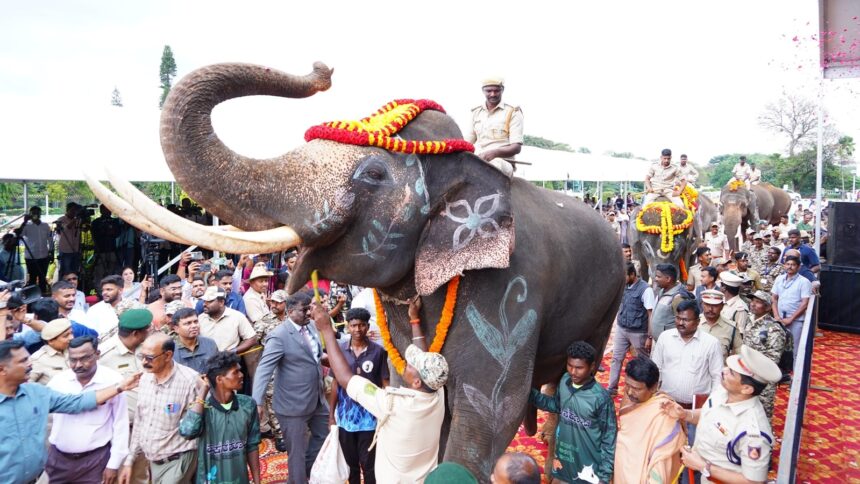The Karnataka government on Wednesday formally handed over four trained kumki elephants to neighboring Andhra Pradesh during a ceremony at the state’s Vidhana Soudha administrative complex. These elephants, highly skilled in conflict mitigation, will assist in controlling wild elephant movements and preventing clashes with human settlements.
What are Kumki elephants?
Kumki (Persian for aid or helper) elephants are captive Asian elephants meticulously trained to perform specialised tasks in wildlife conservation.
Unlike ordinary working elephants, they are conditioned to remain calm in volatile situations, responding solely to their mahouts’ commands. Their primary roles include driving wild elephants away from villages, aiding in rescue operations, and even helping tame newly captured elephants. For instance, when wild elephants raid crops or villages, Kumkis are deployed to chase or guide them back into forests without violence.
After wild elephants are captured (often in a kraal, a temporary enclosure), Kumkis help in their training by walking alongside them and correcting aggressive behavior. They also assist in rescuing elephants stuck in wells, mud, or other dangerous situations.
VIDEO | : The Karnataka government hands over five trained Kumki elephants to Andhra Pradesh. The handover ceremony took place at Vidhana Soudha in Bengaluru, where the majestic elephants were paraded before being transported.
(Full video available on PTI Videos -…
— Press Trust of India (@PTI_News)
Some of India’s most renowned kumki elephants are stationed in the and Kerala, where human-elephant conflicts are frequent. One such celebrated elephant, Kaleem, retired earlier in 2023 after six decades of service. The forest department honoured him with a ceremonial guard of honour, a gesture that moved wildlife enthusiasts and officials alike. A video of the event, shared by an Indian Administrative Service officer, showed the elderly elephant trumpeting as uniformed officers saluted him.
At the heart of every Kumki elephant’s success is its mahout—the skilled handler who trains, guides, and forms a lifelong partnership with the animal. This relationship, built on trust, discipline, and deep mutual understanding, is what makes Kumkis so effective in wildlife management.
The mahaut’s bond with the animals allows them to execute delicate operations, such as silently guiding wild elephants away from populated areas or restraining aggressive individuals during captures. Unlike ordinary captive elephants, Kumkis are highly disciplined and obedient to their mahouts (handlers). They remain calm even in aggressive situations and follow commands precisely. Some are even trained to move silently during operations to avoid alarming wild elephants.
Mahouts are the Kumri elephants’ trainers, protectors, and often the elephant’s closest companion. Their responsibilities include, their daily care, teaching the elephant to follow verbal, tactile, and even foot-based commands, and ensuring the Kumki remains calm and responsive during high-stress operations.
Mahouts often stay with the same elephant for a lifetime. This long-term partnership allows them to read subtle cues, command the elephants without force.
With Karnataka’s transfer of these four kumkis, Andhra Pradesh is expected to bolster its own efforts in managing its growing human-elephant conflicts. As wild spaces shrink and encounters between humans and elephants increase, these trained pachyderms remain an indispensable tool in conservation.








